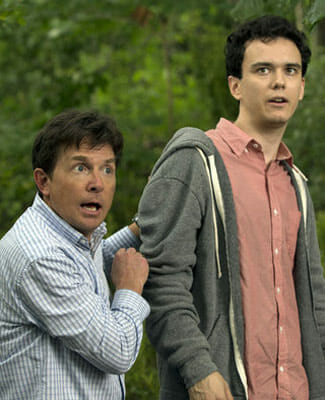
Watching The Michael J. Fox Show serially is a maddening experience for viewers and presumably, by extension, studio executives. This is because the show is not intended to hold a plot, and therefore episodes do not have to be viewed consecutively, but also because the series has been so damn uneven over the first half of the season. What started out as a 22-minute pit of comedy despair and last century’s worst sitcom clichés has shown glimpses of the initial potential promised by the cast. Unfortunately, the growth chart more closely resembles a boring roller coaster than a steady upward trajectory. “Homecoming” was one of the best episodes of the series, but it was preceded by several uninspiring ones and seems destined to be followed by more mediocrity.
That’s enough about the bad, however, as “Homecoming” was a very solid episode that the series can hopefully build upon for the future. In it, Mike and Annie attempt to communicate effectively with their teenage children, which is something neither seemed to have had an interest in doing earlier in the season; indeed, Annie once described Eve as a “skinny enemy.” Mike, feeling that his eldest child has been wasting his potential working as a cheap (and intensely creepy) suit salesman—a job, incidentally, that he pushed Ian very hard to get—tricks him into taking a tour of colleges in upstate New York. On their trip, though, Mike hits a deer, which Ian feels compelled to put out of its misery. Unfortunately, the deer Kangaroo Jacks the two and they follow it into the woods, where each is allowed to get a lot off his chest.
Aside: It seems that one of the writers marathoned The Sopranos prior to watching this episode, as it transitions perfectly from “College”) to “Pine Barrens”). Mike even loses one (Italian!) shoe in the woods. This, in tandem with Mike’s comment that they’ve “changed the future” when he hits the deer in the middle of the road suggest the series is warming up to some very welcome pop culture references.
Back in the woods, Mike accuses Ian of being a quitter because he dropped out of Cornell after failing one economics course. Ian explains that he did not drop out because of one class but because he didn’t feel college was right for him. Furthermore, he tells his father how unloved he feels because the sunlight of Mike’s optimism shines on every aspect of his life except his eldest son. Continuing the “real talk” (but ignoring narrative continuity), Ian says that, although Mike’s inspirational recovery was great, it encompassed his entire childhood. This is perhaps an illogical argument, but it plucks the correct heartstrings, and Mike relents on his mission to force his son into higher education.
Meanwhile, Annie attempts a Girls’ Night with Eve after she discovers that her daughter has been confiding all the details of her love life to her aunt, Leigh. Annie only succeeds in making herself seem even more lame-to-a-16-year-old and grossing out her daughter by describing the time in college that she had sex on a motorcycle. With her future husband. Eve responds as any teenager would after hearing about her parents’ youthful sexual exploits, and the girls’ night is an outright failure. After Eve escapes the next morning in what Leigh describes as “a pretty solid one-night stand sneak out,” Leigh explains to Annie what was obvious from the beginning: Annie can never be the cool confidant because Eve is a teenager and therefore unmolded by parental guidance.
On the other hand, 8-year-old Graham remains very impressionable (as evidenced in last weeks’ nudity). In “Homecoming,” Mike and Annie attempt to throw out Graham’s old toys by explaining that they cannot keep things they no longer use. In a delightfully logical response, Graham begins collecting all the items Mike and Annie no longer use and gives them away. Included are a bread maker, exercycle and, producing genuine, out-loud laughter, a dusty copy of Infinite Jest. It wasn’t quite a scathing critique of consumerism, but it was as close as a middling network sitcom was going to get. And it was brilliant.
This is perhaps the best we’re going to get from The Michael J. Fox Show. It will almost certainly never be at the innovative forefront of comedy—Eve’s warming-the-cockles teary embrace of Annie at the end of the episode serves as a prime example of its reliance on formula—but with this cast it can be very enjoyable. All that remains is sustained success, which has proven difficult to master to this point.